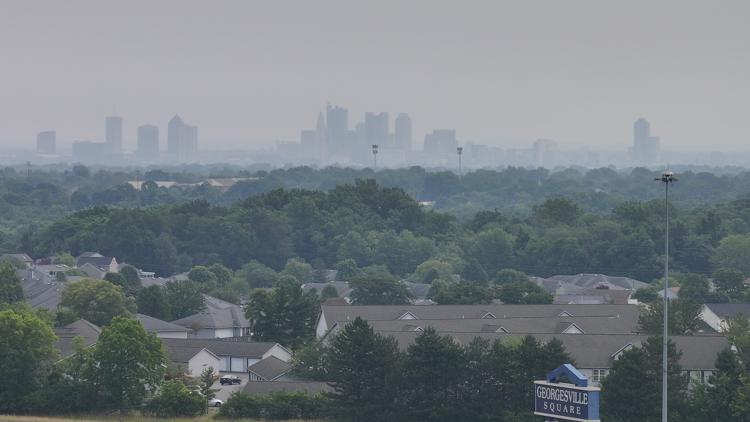COLUMBUS, Ohio — An Air Quality Alert has been issued for some central Ohio counties on Thursday due to ground-level ozone pollution levels that could be unhealthy for sensitive groups.
The pollution levels in Franklin, Fairfield, Delaware and Licking counties are expected to reach an Air Quality Index level of 101. Sensitive groups like active children, the elderly and people with asthma and COPD are more likely to suffer an increase in the number and severity of symptoms during an Air Quality Alert.
A slightly drier air mass will enter Central Ohio, suppressing thunderstorm development. In addition, calm to light winds will hinder dispersion, and mostly sunny skies with temperatures in the mid-90s will enhance ozone development, according to the Mid-Ohio Regional Planning Commission.
This is the second Air Quality Alert issued this season. The first alert was issued on Sunday.
What is the Air Quality Index?
The AQI scale is the Environmental Protection Agency’s index for reporting air quality and runs from 0 to 500. The higher the AQI value, the greater the health concern.
When AQI levels reach above 100, air quality is considered unhealthy for sensitive groups. The MORPC then issues an Air Quality Alert.
Sunday's rating on the AQI is expected to be 101 and the areas affected by the alert — Franklin, Delaware, Fairfield and Licking counties — are likely to experience pollution levels that are unhealthy for sensitive groups.
Who is impacted?
Active children, the elderly and people with asthma and COPD are more likely to suffer an increase in the number and severity of symptoms during an Air Quality Alert.
To decrease the potential for health issues, sensitive groups are urged to limit their outdoor activity or plan outdoor activities for the morning. Those who are experiencing breathing difficulties should consult their doctor.
What actions should you take?
On Air Quality Alert days, MORPC recommends taking actions to improve air quality. The majority of particle pollution levels come from vehicle emissions and burning activity.
- Explore different commute options such as carpooling
- Turn off your engine instead of idling your vehicle to cut down on vehicle emissions.
- Avoid burning wood, leaves and other materials on Alert days and learn more about best wood burning practices.
- Avoid mowing your lawn or using other gas-powered lawn equipment on an Air Quality Alert Day. Longer grass in your yard is good for the air and water quality.



